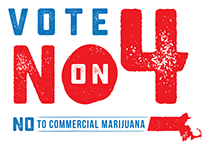Broad-based Bi-partisan Coalition Urges Rejection of Ballot Question to Legalize Commercial Marijuana Industry in Massachusetts
A broad-based, bi-partisan coalition of community leaders and experts joined together today to urge voters to reject the proposed ballot question to legalize the commercial marijuana industry in Massachusetts. Particularly in the context of the addiction crisis we are currently facing, the leaders said allowing the billion-dollar marijuana industry into Massachusetts to market highly potent edible products and increase access to young people is the wrong path for the state. The press conference, held today at the William J. Ostiguy Recovery High School in Boston, was the official kick off of the Campaign for a Safe and Healthy Massachusetts. Participating in the event included Governor Charlie Baker, Boston Mayor Marty Walsh, House Speaker Robert DeLeo, Lieutenant Governor Karyn Polito, Suffolk County Sheriff Steve Tompkins, health and anti-addiction advocates, doctors and educators, and business and public safety leaders.



